Something is deeply wrong when the leaders of the Presbyterian Church (USA), Disciples of Christ, Union for Reform Judaism, the United Church of Christ, and the Unitarian Universalist Association are ordered to leave the US Capitol for praying on behalf of the poor. On Monday, Dec. 4, Rev. Denise Anderson, Rev. Teresa Hord Owens, Rabbi Jonah Pesner, Rev. Traci Blackmon and Rev. Susan Frederick-Gray — accompanied by dozens of other clergy — gathered for prayer under the Capitol dome to launch the new Poor People’s Campaign. As Rev. William J Barber II led the group in prayer, police officers gave an ultimatum: leave the Capitol or be arrested.
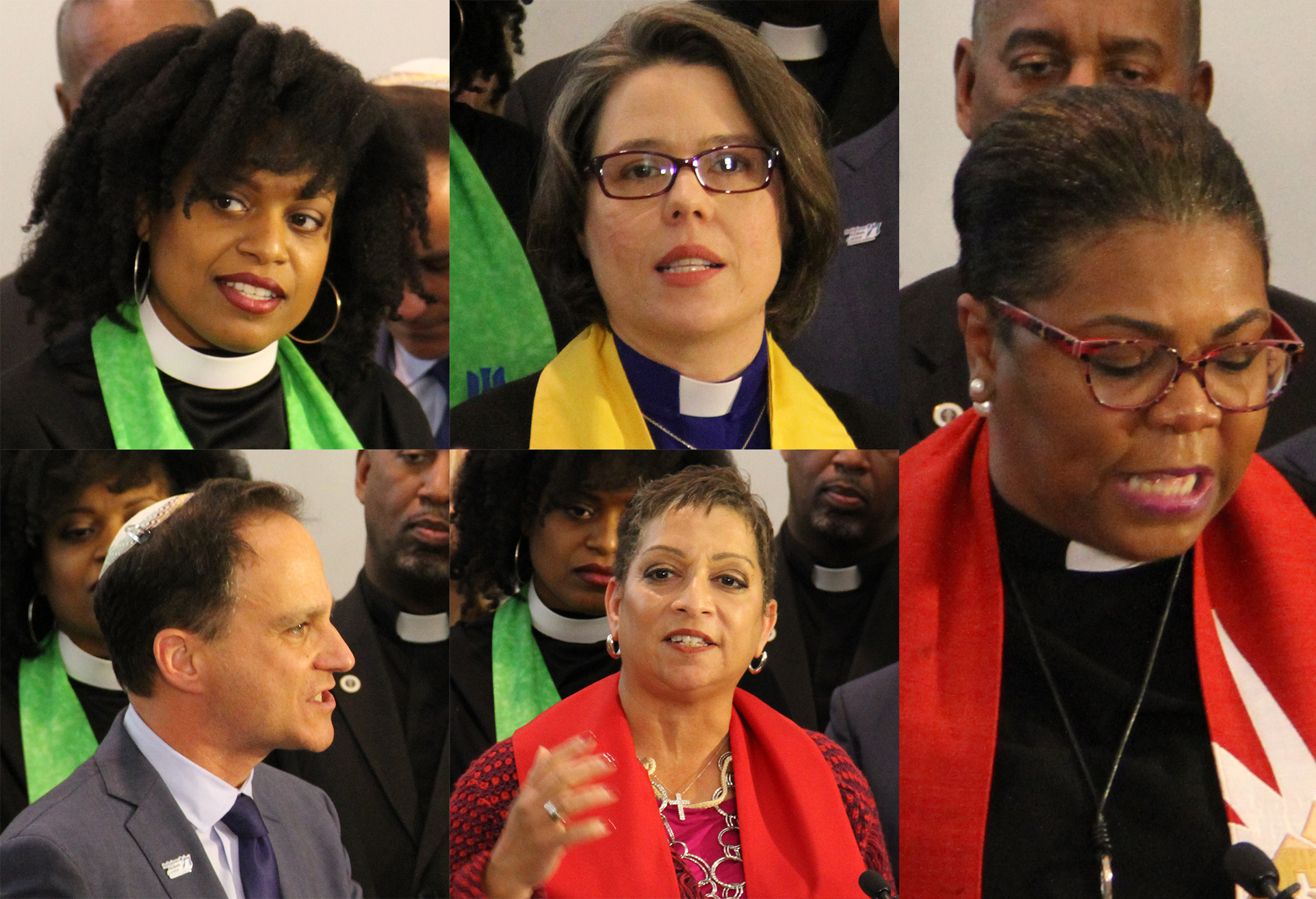
It’s a fitting start to a campaign that’s planning the coordinated civil disobedience of more than 25,000 people this spring. This new Poor People’s Campaign resurrects the movement Martin Luther King Jr. began in 1967, cut tragically short by his assassination, and applies his ethos of non-violent yet confrontational love to a modern and robust policy platform. This present-day incarnation is co-directed by Rev. Barber, Union visiting Professor of Public Theology & Activism, and Rev. Liz Theoharis, Co-Director of Union’s Kairos Center. While the campaign most overtly addresses the plight of the over 45 million Americans who live in poverty, its bold agenda also aims to confront the white supremacy, environmental destruction, voter suppression, and unchecked militarism that ravage our nation.
Initially, the group requested a meeting with the Speaker of the House and the Senate Majority Leader to discuss these issues, but their request was denied. This refusal is perhaps unsurprising, given Washington’s reticence to examine these moral calamities. At a press conference launching the campaign, Rev. Barber noted, “We went through the 2016 election season without one serious debate about poverty, ecological devastation, the war economy or the war on voting rights in this country.”
Powerful forces do not want to confront these issues. Despite this framing, however, it’s still surreal to witness clergy expelled from the seat of our democracy for praying we might address rampant poverty, while leaders inside plan the single largest upward redistribution of wealth in our nation’s history.
A Movement Led By Those Affected
If you attend a Poor People’s Campaign meeting, one thing becomes immediately clear: It is fundamentally a grassroots movement. Every gathering begins with testimony from those who suffer the evils the campaign seeks to redress. Monday’s national launch was no different: Before reporters heard a single word from clergy, they first listened to the heartbreaking stories that have become so horrifyingly commonplace.
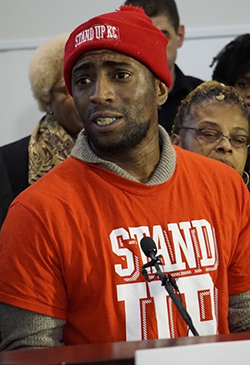
Terrence Wise, a McDonalds employee and organizer from Kansas City, MO, spoke of how his family was forced to live in their car — despite he and his wife working full-time. “Going to bed at night, ignoring my own stomach’s rumbling,” lamented Watts, “but having to hear my three little girls’ stomachs rumble, that’s something no parent should have to endure.”
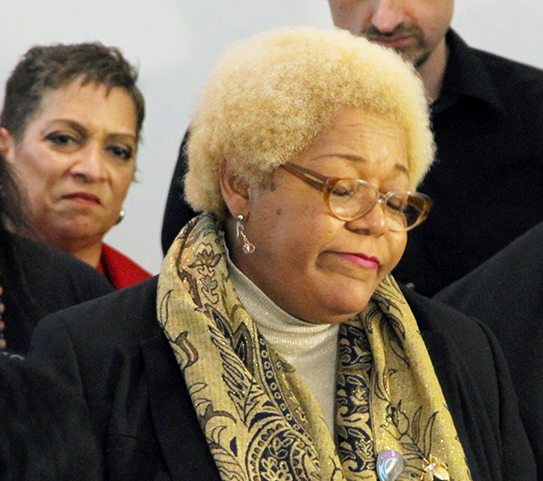
Mashyla Buckmaster, a formerly homeless woman from Washington state, reported “a man threw a log through the window of the building where I was staying because he was so enraged that homeless people were living on his block.” Callie Greer, from Salem, Alabama, described how her daughter died of cancer, left untreated because her state government refused to expand Medicaid. “No one should have to bury their child in America because they don’t have healthcare,” she said with sadness and fury.
The decision by Barber and Theoharis to place affected people squarely at the center of the movement speaks to their deep humility, but also to their savvy as organizers. When grassroots movements gain national prominence, too often leadership becomes disconnected from those for whom they fight. The Poor People’s Campaign, though, has thus far escaped this fate.
Their success in remaining bottom-up stems, in part, from the movement’s goals. Since the campaign plans to orchestrate simultaneous, coordinated civil disobedience in over 25 states, it’s necessary to cultivate regional leadership. Indeed, the campaign’s dynamic, grassroots nature is one of its strongest assets. At the beginning of Monday’s press conference, Rev. Barber took roll call of folks dialing in from around the country. No sooner than he announced a state’s name, his voice was met with a jubilant digital chorus. The people, it seems, are ready.
“Nothing is as powerful as an idea whose time has come.”
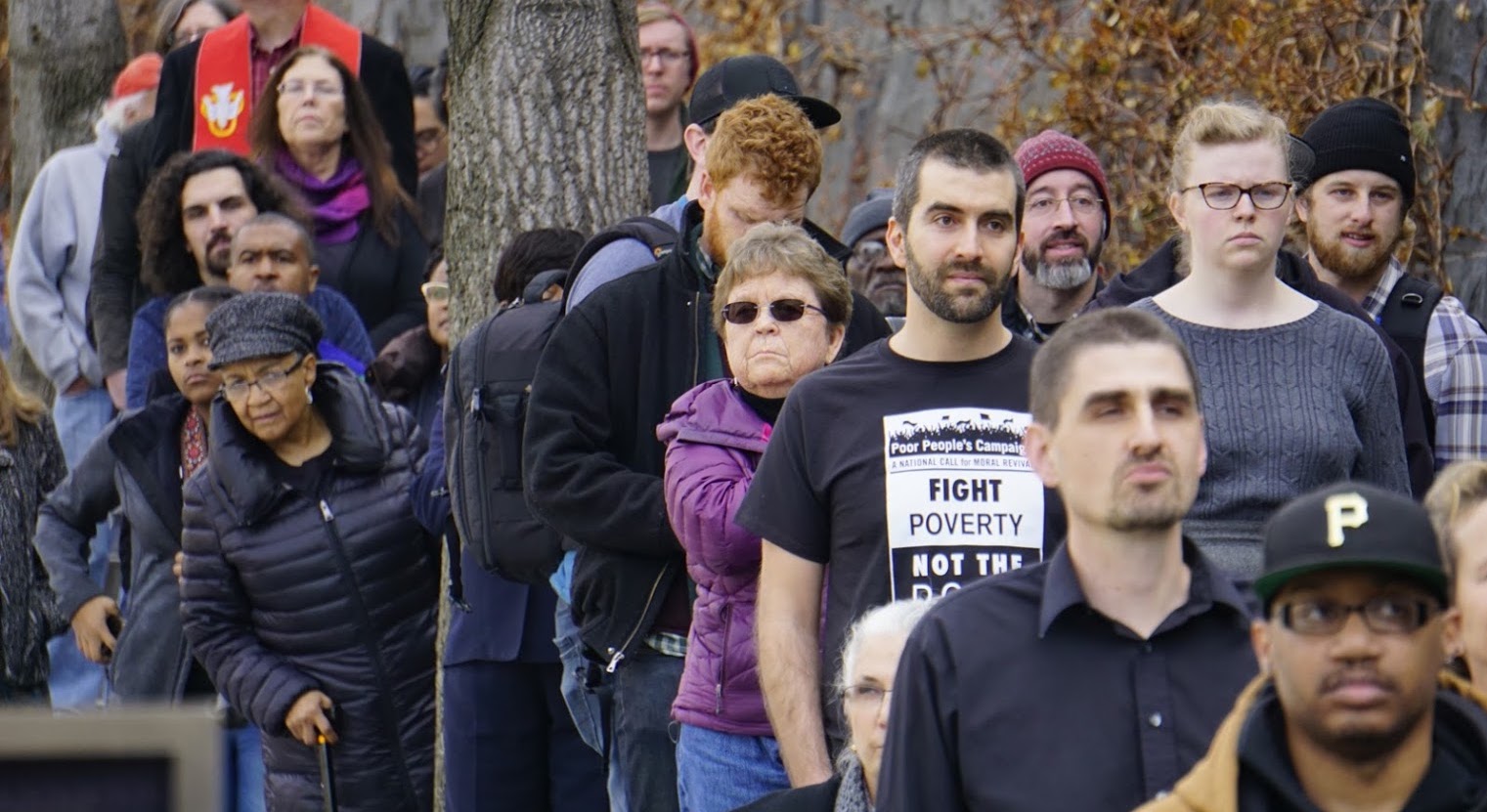
Upon the leaving the Capitol, Barber called clergy and supporters around him and made a simple request: “Let’s shake the foundations of this nation together.” And indeed, one thing is painfully clear — our country’s foundations need deeply to be shook.
In the fifty years since MLK Jr. started the inaugural campaign, we have witnessed a brutal assault on our nation’s hard-won gains. Our unions have been decimated. The minimum wage, untethered from inflation, has remained so stagnant that now millions of full-time workers find themselves unable to provide even the most basic necessities for their families. Twenty-three states have passed voter suppression laws, in a shameful attempt to disenfranchise people of color, and poor folks of all races. And now, with this current attempt to further enrich corporations and the wealthy, Congress plans to add $1.4 trillion to the national debt. As Theoharis noted in her remarks, this move sets the stage for savage cuts to Social Security, Medicare, Meals on Wheels, and the other vestiges of our social safety net that still persist.
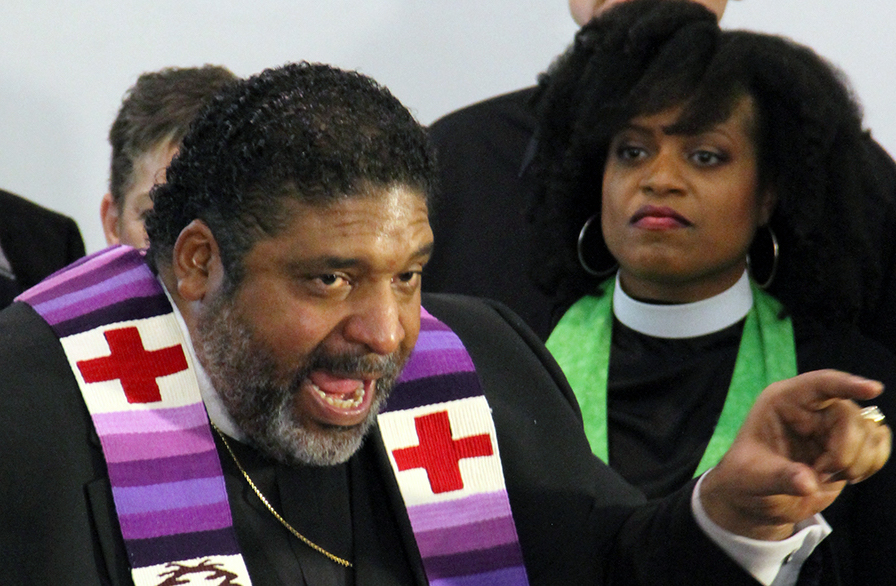
In stark contrast, the past decades have been boom times for the wealthiest among us. Thirty-eight percent of our nation’s wealth is now owned by 1% of our citizens. Multi-national corporations have all but exterminated main-street businesses; America hasn’t seen monopolies this large since the Gilded Age’s infamous excesses. Our government has permitted corporate price gouging on everything from basic utilities to life-saving medication. One needn’t be an economics or social science professor to see how perverse our ethics have become.
“Woe to those who make unjust laws, to those who issue oppressive decrees to deprive the poor of their rights and withhold justice from the oppressed of my people.” Back at the press conference, Barber quotes Isaiah, and a palpable energy permeates the room. His words are punctuated with shouts of “Amen!” and “Preach!” from those assembled, as the United Methodist Building’s stately confines begin to increasingly resemble the pitched fervor of a revival tent. “We aren’t going to protest in a corner somewhere,” Barber cries, “The US Capitol and US State Houses are the people’s houses. These are our houses.”
Have we allowed ourselves to become so removed from our democracy — so inured to politicians’ giving lip service to the poor while bestowing lavishly upon the wealthy — that we no longer feel Barber’s words crackling with the electricity of long-unspoken truth? These are the people’s houses, and it’s time we took them back.
